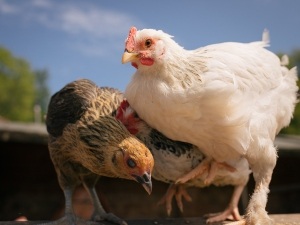
Chickens are usually very alert animals, these birds will wake up bright and early and will run out to start their day full of energy.
If your bird starts acting odd, if the bird starts acting disoriented, you’d be right to be worried. This article explores why this may be happening
Table of Contents
Chicken acting disoriented:
A change in your bird’s behavior is a sign that there is something up with your bird, here are possible reasons why your bird may be acting disoriented:
Inner ear infection:
Birds have ears, and these ears can become infected. Chicken ears have more use than helping the bird hear, they also play a major role in balancing the animal.
If your bird’s inner ear becomes infected, the bird can start to suffer neurological signs like disorientation, a loss of balance, a loss of coordination, and a head tilt. Inner ear infections are more often than not caused by viral infections.
What to do:
The bird’s ear needs a cleaning, if you choose to do this at home then you’d need to use a q tip and hydrogen peroxide to clean the inside of the bird’s ear, but this route is not recommended.
Cleaning the ear yourself can make the situation worse, you can easily push the q-tip too deep into the bird’s ear while cleaning.
It is recommended that you get an avian vet to extract the material from the bird’s ear if you can.
Your vet may also give the bird antibiotics if the pathogen that caused the ear infection can be treated by antibiotics.
Using corticosteroids or antibiotics can help in some cases but unfortunately many of the pathogens that cause birds to develop ear infections are resistant to these medications.
Ataxia:
Ataxia is a condition that can cause chickens to develop problems with their nervous system and musculoskeletal system.
The causes of ataxia in birds vary, some causes of ataxia include disorders of the nervous system, disorders of the musculoskeletal system, a vitamin E, selenium, or calcium deficiency as well as a variety of diseases.
Birds with this disorder will have trouble perceiving their physical position. This will cause the bird to not be able to coordinate movements as it should and this will cause the bird to act disoriented.
Birds who have this illness will be clumsy, balance themselves by hooking their beaks to their cages, fall off of their perch, stumble and fall over sometimes
What to do:
Ataxia is a very serious condition. If you think that this is what is plaguing your bird you’d need to take your bird to the vet as soon as possible.
You’d need to give your vet your bird’s medical history and inform your vet of the environments the bird has lived in, and currently lives in.
Your vet will then proceed to do a physical exam on the bird as well as diagnostic tests including a complete blood count, a test for heavy metal toxicity, choanal samples, a radiograph as well as a serum biochemistry panel
If it is found that your bird does indeed have ataxia then the bird will be hospitalized, be given injectable medications, nutrient support, be given subcutaneous fluids to keep it hydrated as well as anti-fungal medications or antibiotic medications depending on the underlying reason for the ataxia.
A change in weather:
A change in weather can make your bird lethargic and disoriented, this change in weather can either be an increase in temperature or a decrease in temperature.
The bird may start to have difficulty standing, may lose its ability to balance, and may seem oblivious to its surroundings.
Chickens who are healthy make sure to stay keenly aware of their surroundings looking for potential dangers that may come their way.
A sick bird may also not react to stimuli in its surroundings, like not running off when you approach it, and may have a difficult time opening its eyes.
What to do:
You’d need to get the bird into an environment with a reasonable temperature for the bird. The optimal temperature for your bird to be in is between 65 degrees and 75 degrees Fahrenheit.
If your bird is overheating then you’d want to get it out of the sun and allow it to rest in a shaded place. Also, give the bird cold water and cold water-rich foods to cool down.
If your bird is in a cold environment then adding a heat lamp (often a 250W reddish bulb with a reflector) to your chicken’s coop would be a good idea. Installing deep bedding will also help to keep the birds warm.
If you enjoyed this article then you may also be interested in other chicken related articles. Here are some articles that you may be interested in: Chicken Sounds Hoarse, Sick Chicken Not Eating Or Drinking, Chicken Acting Like Something Stuck In Its Throat, Runt Chick Not Growing, Rooster Keeps Falling Over

